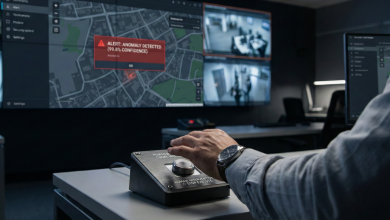
The beauty of a global, interconnected world brings people and goods closer together than ever before, yet the very benefit of interconnectivity also creates challenges for those charged with securing a nation’s borders. From human trafficking and narcotics smuggling to terrorism and illegal wildlife trade, today’s border threats are increasingly multifaceted, fast-moving and technologically sophisticated.
Yet amid these complexities, one constant remains: criminal activity, whether physical or digital, inevitably leaves a footprint. Even when attempts are made to erase these traces, digital forensics can recover critical evidence to safeguard national borders.
As the nature of crime evolves, so must the strategies to combat it. Border security agencies worldwide are modernising their operations by investing in AI-powered digital forensic and investigative solutions, tools that not only improve detection and response but also ensure lawful access, secure evidence handling and efficient cross-agency collaboration.
Real-time mobile data access
In the digital age, mobile devices are often the most revealing piece of evidence, with 98% of prosecutors reporting that digital evidence is pivotal in securing convictions, and more than half believing it is more important than DNA.
Whether it’s a phone, tablet or laptop, devices frequently hold a trove of data like call logs, location history, images or deleted messages that can provide crucial content about a person’s identity, intent and affiliations. Lawfully accessing this data quickly is paramount to keeping border operations running smoothly.
At border crossings, time is of the essence and agents must move quickly to determine who poses a threat and the intent of the individual. AI-driven digital investigative tools allow agents to perform selective or full-file system data extraction in real-time. These capabilities effectively extend the digital lab into the field to enable agents to conduct targeted triage on devices, verify identities and assess potential threats on the spot.
By equipping field agents with these solutions, agencies significantly reduce investigation time and can make accurate, data-backed decisions within moments, ensuring border operations remain both efficient and secure.
Information sharing
Criminal networks often operate across borders by exploiting gaps in international communication and coordination. To counteract these threats, border security doesn’t stop at a nation’s edge, it requires seamless cooperation between public safety agencies, both domestically and internationally.
Modern digital investigative and intelligence platforms enable border agents to share critical findings with public safety and counter-terrorism units across jurisdictions in real-time. Secure sharing of intelligence enhances efforts to identify and intercept suspected terrorists, traffickers and smugglers before they succeed in crossing borders or reaching their intended targets.
In high-stakes scenarios, time and accuracy can mean the difference between prevention and devastation and these technologies are proving to be indispensable. The ability to share insights from digital evidence accelerates responses, bolsters international investigations and ultimately strengthens global security networks.
Leveraging AI to help manage digital evidence
One of the critical aspects of border security is the effective management of digital evidence. Border agencies must ensure they can have a fully auditable evidence collection process. A strong system ensures digital evidence is accessed, collected, analysed and properly managed to maintain an ironclad chain of custody.
Digital evidence is only valuable when it is managed properly. Ensuring a full auditable chain of custody is crucial, especially when the stakes include prosecution or interagency escalation.
Today’s border security solutions integrate powerful case end evidence management capabilities that help agencies maintain operational integrity throughout the investigative lifecycle. AI-powered workflows enable standardised legally compliant processes, from consent form capture to investigative note logging. Agents can manage everything from a centralised system to reducing redundancy, error and time that is otherwise lost on manual inputs.
These platforms also streamline coordination between departments to ensure the right data reaches the right analysts or prosecutors exactly when needed. Such orchestration not only preserves legal standards but also enhances investigative efficiency at every step.
The power of digital forensics: key decision making for border security
Digital investigative solutions inform real-time, data-decision-making with actionable insights derived from mobile devices, cloud data and external databases.
Whether it’s identifying a person of interest, confirming the authenticity of travel documents, or detecting suspicious patterns in communications, intelligence gained from lawfully accessing digital devices allows agents to act decisively. These timely, informed decisions can prevent illegal crossings, disrupt smuggling operations or even save lives during high-risk encounters.
In scenarios where every second counts, having real-time access to digital intelligence enables border agencies to pivot from reactive enforcement to proactive prevention, strengthening national security from the frontline outward.
Digital forensics is transforming border security by providing agencies with the solutions they need to manage digital evidence, access mobile device data and integrate digital intelligence into their operations. As border security challenges continue to evolve, the adoption of advanced digital investigative solutions will be crucial in ensuring the safety and security of nations worldwide.
By investing in these technologies, governments empower their agencies to keep pace with the ever-evolving nature of transnational crime. Real-time data access, global collaboration, secure evidence management and intelligence-led decision-making are no longer optional, it is essential to keep nations safe.
In today’s interconnected world, border security isn’t just about who comes in, it’s about understanding how, why and with what intent. AI-powered digital forensics and investigations offers the answers needed to keep nations safer.




